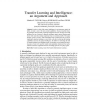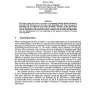543 search results - page 20 / 109 » Argumentation Using Temporal Knowledge |
134
click to vote
FOIKS
2008
Springer
15 years 3 months ago
2008
Springer
Abstract. Argumentation-based formalisms provide a way of considering the defeasible nature of reasoning with partial and often erroneous knowledge in a given environment. This pro...
140
click to vote
AGI
2008
15 years 3 months ago
2008
In order to claim fully general intelligence in an autonomous agent, the ability to learn is one of the most central capabilities. Classical machine learning techniques have had ma...
127
click to vote
EUROCRYPT
2007
Springer
15 years 6 months ago
2007
Springer
Abstract. We introduce a notion of instance-dependent verifiable random functions (InstD-VRFs for short). Informally, an InstD-VRF is, in some sense, a verifiable random function [...
111
click to vote
SIGLEX
1991
15 years 5 months ago
1991
This paper argues that there is no reason to distinguish between lexical information and real-world information on the basis of the formalisms used; that both types of knowledge c...
119
Voted
TKDE
2010
15 years 19 days ago
2010
Abstract—The imperfect nature of context in Ambient Intelligence environments and the special characteristics of the entities that possess and share the available context informa...


